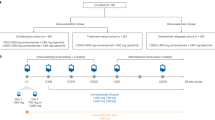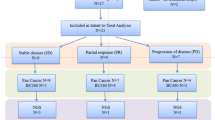Abstract
Introduction
The epidermal growth factor receptor (EGFR) is a validated target in malignancy; however, patients with wild type EGFR obtain little sustained benefit from anti-EGFR monotherapy. Epigenetic therapy to reactivate tumor suppressor genes may enhance the anti-proliferative effect of erlotinib. This phase I study evaluated the combination of erlotinib and 5-azacytidine for safety and maximal tolerated dose (MTD).
Methods
Thirty patients with advanced solid tumors were treated in a standard 3 + 3 cohort design. Erlotinib was dosed at 150 mg daily, and 5-azacytidine was escalated by increasing the number of daily doses of 75 mg/m2 per cycle. Patients were followed for dose-limiting toxicity (DLT). Efficacy was assessed by RECIST criteria.
Results
Common non-hematologic toxicities included rash, diarrhea, nausea, and fatigue; the majority was ≤ Grade 2. DLTs included conjunctivitis in cohort 1 and infusion reaction in cohort 2. No DLTs occurred in cohorts 3, 4, or 5; however, 2 serious neutropenic infections arose in cohort 5 after cycle 1. Cohort 4 was expanded to 6 patients and was the MTD. Partial response (lung, ovarian) and stable disease occurred in 2 and 11 patients, respectively. Median progression-free survival was 2 months. Two patients with lung and larynx cancer had prolonged stable disease.
Conclusion
The combination of erlotinib and 5-azacytidine was well tolerated with interesting clinical activity in lung, head and neck, and ovarian cancer. The recommended dose for phase II study is erlotinib 150 mg daily and 5-azacytidine 75 mg/m2 daily on days 1–4 and 15–18 of a 28-day cycle.
Similar content being viewed by others
References
Lurje G, Lenz H (2009) EGFR signaling and drug discovery. Oncology 77:400–410
Salomon DS, Brandt R, Ciardiello F, Normanno N (1994) Epidermal growth factor-related peptides and their receptors in human malignancies. Crit Rev Oncol Hematol 19:183–232
Chung CH et al (2006) Increased epidermal growth factor receptor gene copy number is associated with poor prognosis in head and neck squamous cell carcinomas. JCO 24(25):4170–4176
Hemming AW, David NL, Kluftinger A et al (1992) Prognostic markers of colorectal cancer: an evaluation of DNA content, epidermal growth factor receptor, and Ki-67. J Surg Oncol 51:147–152
Ueda S, Ogata S, Tsuda H et al (2004) The correlation between cytoplasmic overexpression of epidermal growth factor receptor and tumor aggressiveness; poor prognosis in patients with pancreatic ductal adenocarcinoma. Pancreas 29:e1–e8
Lynch TJ, Bell DW, Sordella R et al (2004) Activating mutations in the epidermal growth factor receptor underlying responsiveness of non-small cell lung cancer to gefitinib. NEJM 350:2129–2139
Rosell R, Moran T, Queralt C et al (2009) Screening for epidermal growth factor receptor mutations in lung cancer. NEJM 361:1–10
Camp ER, Summy J, Bauer TW et al (2005) Molecular mechanisms of resistance to therapies targeting the epidermal growth factor receptor. Clin Can Research 11(397):397–405
Herman JG, Baylin SB (2003) Gene silencing in cancer in association with promoter hypermethylation. NEJM 349(21):2042–2054
Jones PA, Baylin SB (2002) The fundamental role of epigenetic events in cancer. Nat Rev 3:415–427
Shen L, Kantarjian H, Gui Y et al (2010) DNA methylation predicts survival and response to therapy in patients with myelodysplastic syndromes. JCO 28(4):605–613
Therasse P, Arbuck SG, Eisenhauer EA et al (2000) New guidelines to evaluate the response to treatment in solid tumors (RECIST Guidelines). JNCI 92:205–216
Rustin GJ, Quinn M, Thigpen T et al (2004) New guidelines to evaluate the response to treatment in solid tumors (ovarian cancer). JNCI 96(6):487–488
Shepherd FA, Pereira JR, Ciuleanu T et al (2005) Erlotinib in previously treated non-small cell lung cancer. NEJM 353(2):123–132
Cohen MH, Williams GA, Sridhara R, Chen G, Pazdur R (2003) FDA drug approval summary: gefitinib (ZD1839) (Iressa) tablets. Oncologist 8:303–306
Vigil CE, Martins-Santos T, Garcia-Manero G (2010) Safety and efficacy of azacitidine in myelodysplastic syndromes. Drug Des Dev Ther 4:221–229
Stresemann C, Lyko F (2008) Modes of action of the DNA methyltransferase inhibitors azacytidine and decitabine. Int J Cancer 123:8–13
Jones PA, Taylor SM (1980) Cellular differentiation, cytidine analogs and DNA methylation. Cell 20(1):85–93
Baylin SB (2005) DNA methylation and gene silencing in cancer. Nat Clin Pract Oncol 2S(1):S4–S11
Belinsky SA, Grimes MJ, Picchi MA et al (2011) Combination therapy with Vidaza and Entinostat suppresses tumor growth and reprograms the epigenome in an orthotopic lung cancer model. Cancer Res 71(2):454–462
Juergens R, Vendetti F, Wrangle J et al (2010) A phase II study of combination epigenetic therapy in advanced non-small cell lung cancer. American Association for Cancer Research 101st Annual Meeting, 17–21 April 2010. Abstract LB-411
Herman JG, Baylin SB (2003) Gene silencing in cancer in association with promoter hypermethylation. N Engl J Med 349:2042–2054
Baylin SB, Ohm JE (2006) Epigenetic gene silencing in cancer—a mechanism for early oncogenic pathway addiction? Nat Rev Cancer 6:107–116
Belinsky SA, Nikula KJ, Palmisano WP et al (1998) Aberrant methylation of p16 INK4a is an early event in lung cancer and a potential biomarker for early diagnosis. Proc Natl Acad Sci USA 95:11891–11896
Wang Y, Zhang D, Zheng W et al (2008) Multiple gene methylation of non-small cell lung cancers evaluated with 3-dimensional microarray. Cancer 112(6):1325–1336
Liu WB, Liu JY, Ao L et al (2010) Epigenetic silencing of cell cycle regulatory genes during 3-methyl cholanthrene and diethylnitrosamine-induced multistep rat lung cancer. Mol Carcinog 49(6):556–565
Noro R, Gemma A, Miyanaga A et al (2007) PTEN inactivation in lung cancer cells and the effect of its recovery on treatment with epidermal growth factor receptor tyrosine kinase inhibitors. Int J Oncol 31(5):1157–1163
Brock MV, Hooker CM, Ota-Machida E et al (2008) DNA methylation markers and early recurrence in stage I lung cancer. NEJM 358:1118–1128
Author information
Authors and Affiliations
Corresponding author
Rights and permissions
About this article
Cite this article
Bauman, J., Verschraegen, C., Belinsky, S. et al. A phase I study of 5-azacytidine and erlotinib in advanced solid tumor malignancies. Cancer Chemother Pharmacol 69, 547–554 (2012). https://doi.org/10.1007/s00280-011-1729-2
Received:
Accepted:
Published:
Issue Date:
DOI: https://doi.org/10.1007/s00280-011-1729-2




